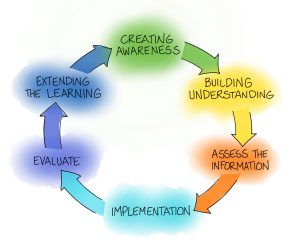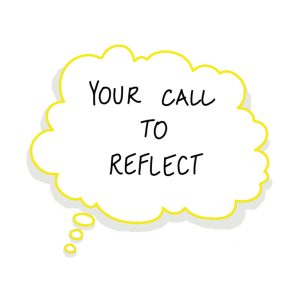5.2 Professional Development Cycle
Whether you are new to education or have been working with children and families for many years, all educators go through the same cycle for professional development. This 6-part process includes:
- Creating Awareness – what do you want to know more about? Where can you go to get training or information?
- Building Understanding – expand your knowledge of the topic you are interested in and learn what the big ideas are.
- Assess the Information – is this something that will help you in your practice? How will you implement it? What supports or resource might you need?
- Implementation – plan, prepare and implement the new knowledge. Practice, refine, and practice some more.
- Evaluate – Did your learning have a positive impact? Is there more information you need? Will you integrate the new learning into your habits and routines?
- Extending the Learning – What else do you want to know about the topic? Are there other resources available? How can you further increase your knowledge? (See create awareness)
 Successful ECCE professionals engage in a cycle of reflective practice that increases their awareness and continues their development. This development cycle can be seen in all career stages except Survival. The reason? Because when you are in survival mode you are unable to learn and retain new information. Your brain is quickly evaluating and deciding on the issue or problem it is currently facing.
Successful ECCE professionals engage in a cycle of reflective practice that increases their awareness and continues their development. This development cycle can be seen in all career stages except Survival. The reason? Because when you are in survival mode you are unable to learn and retain new information. Your brain is quickly evaluating and deciding on the issue or problem it is currently facing.
Reflective Practice & Professional Development
Reflective practice and professional development go hand in hand! Reflective practices are when you think back on how a particular project, action, task, or day went and you identify what went well and what you might want to do differently in the future. Reflective actions can include:
- Taking time each day to reflect on something that worked really well or not so well.
- Sharing your experiences with others in the field.
- Keeping a journal or log of best practices in your classroom as well as challenges.
- Determining what you could have done differently.
- Seeking out a mentor or coach to help you sort through your reflections and identify areas for continued growth
 Reflect on something that is going well for you right now. What evidence supports your thought that it is going well? How is this having a positive impact? What steps can you take to act with intention to continue success?
Reflect on something that is going well for you right now. What evidence supports your thought that it is going well? How is this having a positive impact? What steps can you take to act with intention to continue success?
Responsibility for Learning
No matter how long you have worked in ECE or what your role may be in the classroom or program, as a professional you have a responsibility to ensure that you have the education needed to perform your job in the best way possible. This means participating in professional development that prepares you for the position you are or will be in. Engaging in ongoing professional development continues your education about topics relevant to your work with children and families.
Ongoing Professional Development
- Ensures you stay current with the latest research.
- Provides you with opportunities to create awareness about what you don’t know.
- Assists you in achieving your career goals.
- Engages you with others in the field.
- Provides you with opportunities to learn and explore diverse topics, perspectives, and contexts.
Professional Development of Others
Your leadership role may involve supporting the professional development of someone else. From creating individual professional development plans to providing professional development for groups, there are different methods for supporting others’ ongoing professional development.
The following are the most common forms of professional development:
Training is a learning experience specific to a topic and related set of skills or dispositions, delivered by a subject matter expert with adult learning knowledge and skills.
Technical Assistance (TA) is the targeted and customized support by a subject matter expert to develop or strengthen processes, knowledge application, or implementation of services by professionals.
Mentoring is a relationship-based process between people in similar professional roles, the mentor, provides guidance and example to the less-experienced mentee. Mentoring is intended to increase an individual’s professional capacity, resulting in greater effectiveness.
Coaching is a relationship-based process led by an expert with specialized and adult learning knowledge and skills. Coaching is designed to build capacity for specific professional skills and is focused on goal-setting and achievement for an individual or group.
Professional Development Advising ) is a process through which an advisor offers information, guidance, and advice about professional growth, career options, and pathways.
Peer-to-Peer TA fosters the development of relationship-based learning and support communities among individuals, often in like roles. Peers have developed tools and strategies that can be shared with their colleagues.
Job-Embedded Professional Development (JEPD) refers to educator learning that is grounded in day-to-day teaching practice and is designed to enhance teachers’ content-specific instructional practices with the intent of improving student learning.
Reflective Supervision is the regular collaboration between staff member and supervisor where the thoughts, feelings and experiences of the staff member are the focus of improving skills and competencies.
In conclusion, you can see there is a wide range of professional development delivery methods. Each method provides the learner with specific supports and opportunities based on a number of factors including career stage of the learner, career stage of the leader, resources, context, and type of desired outcome.
Example
As a leader, you will need to evaluate these factors to determine the best method for delivering learning for individual staff members as well as the team as a whole. While ongoing professional development hours are often a requirement for licensure or quality standards, they are not the only method for increasing knowledge and competency of staff.
Remember, the best methods for ensuring staff increase their skills/competencies through professional development is to work collaboratively for a mix of modalities that allow for knowledge transfer, practice, feedback, and behavior change. Learning needs to be supported on a regular basis and should become a regular part of your organization’s culture. As a professional, it is up to you to continue your professional growth and development as you move through the stages of your career. Learning can be an ongoing journey full of joy and discovery that invigorates and increases the quality of your daily practice.
Adaptation Credit
Adapted from Chapter 2 in Leadership in Early Care and Education by Dr. Tammy Marino; Dr. Maidie Rosengarden; Dr. Sally Gunyon; and Taya Noland is licensed under a Creative Commons Attribution-NonCommercial-ShareAlike 4.0 International License, except where otherwise noted.

